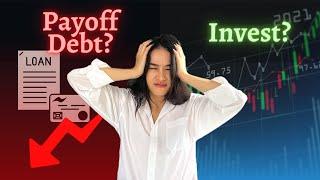
Invest or PayOff Debt: The Optimal Order
#nhubee
When it comes to personal finance, people would have different opinions on how they should allocate their money. Some would say it is best to pay off all your debt first, some might tell you to invest it as soon as you have extra cash, and some will say you should leave it there in your bank account because you might need it some day. Lots of different answer, so what is the right order to do with your money? Should you pay off all your debt first? Or should you invest it?
When it comes to your money, there are a lot of choices you can make. You can choose to set up an emergency fund, choose to pay off your debt or you can choose to invest it. There is no right or wrong answer, but i believe there should be a mathematical order you can take to optimize your money. So in this video, we will be going over, all the steps you’ll need to identify the optimal way to allocate your money between debt and investment in the most mathematical sense.
Priority #1. Small emergency fund
If there is one thing that 2020 has taught us, it’s that you’ll definitely need an emergency fund. Because we’ll never know what is going to happen in the future.
Before you decide to allocate any of your money into paying off debt or investing them, your first priority on the list should be building up a stash of cash sitting in your account. Because they’re useful to everyone and protect you from falling into debt when life happens.
Priority #2. Max out your 401k
401k is an employer-sponsored account where you can make a pre-tax contribution, so that you could invest them over time. If you work for an employer that offers 401k match contribution, this should be your next priority. Because a 401k match provides you with an instant 100% guaranteed return on your investment. That’s basically free money, plus, you’ll get a tax deduction for contributing to your 401(k)
Priority #3, Pay off High-Interest Debt
For anything with an interest rate above 5% is considered as high interest. Why 5%?
Because the annualized average return of the SP500 is 9%.
If you have debt with an interest rate below 5%, you could make a few percent more money if you invest them instead of paying off debt with low interest.
However, debt with high interest like credit card debts with average interest somewhere between 15-25% that you carry from month to month. This is where you want to start out with your debt reduction plan.
Priority #4: Invest into a tax advantage investment account
The reason why I think we should make a little investment into this type of account instead of putting that money to pay off debt is because, I think it makes sense number-wise.
When investing in an index fund, we can expect to earn a 7-9% annual return on our investment. Which is probably more than the interest rate you make on your low interest debt of less than 5%.
Priority #5 on the list, pay off the remaining debt, except mortgage
Now you should get aggressive in paying off your low interest debts. At this point, you should be doing the bare minimum for savings and investing just like we talked about in the previous 4 steps. And you’re making as many payments as you can
Priority #6: Save up for other things and pursue your investing goal
After paying off all your debts, you dont have to make any more monthly payment. Once you are debt free, you are going to have so much free cash flow to start building up your asset. You can use this money to fund for other things like building a bigger emergency fund, 3-6 months to make you really bulletproof.
Chapters:
0:00 Intro
0:51 1. Starter Emergency Fund
2:12 2. Max Out Employer's 401(k) Contribution
4:17 3. Pay Off High Interest Loan
6:35 4. Invest In Tax Advantage Account
7:54 5. Pay Off Remaining Debt
8:29 6. Save and Pursue Your Financial Goal
When it comes to personal finance, people would have different opinions on how they should allocate their money. Some would say it is best to pay off all your debt first, some might tell you to invest it as soon as you have extra cash, and some will say you should leave it there in your bank account because you might need it some day. Lots of different answer, so what is the right order to do with your money? Should you pay off all your debt first? Or should you invest it?
When it comes to your money, there are a lot of choices you can make. You can choose to set up an emergency fund, choose to pay off your debt or you can choose to invest it. There is no right or wrong answer, but i believe there should be a mathematical order you can take to optimize your money. So in this video, we will be going over, all the steps you’ll need to identify the optimal way to allocate your money between debt and investment in the most mathematical sense.
Priority #1. Small emergency fund
If there is one thing that 2020 has taught us, it’s that you’ll definitely need an emergency fund. Because we’ll never know what is going to happen in the future.
Before you decide to allocate any of your money into paying off debt or investing them, your first priority on the list should be building up a stash of cash sitting in your account. Because they’re useful to everyone and protect you from falling into debt when life happens.
Priority #2. Max out your 401k
401k is an employer-sponsored account where you can make a pre-tax contribution, so that you could invest them over time. If you work for an employer that offers 401k match contribution, this should be your next priority. Because a 401k match provides you with an instant 100% guaranteed return on your investment. That’s basically free money, plus, you’ll get a tax deduction for contributing to your 401(k)
Priority #3, Pay off High-Interest Debt
For anything with an interest rate above 5% is considered as high interest. Why 5%?
Because the annualized average return of the SP500 is 9%.
If you have debt with an interest rate below 5%, you could make a few percent more money if you invest them instead of paying off debt with low interest.
However, debt with high interest like credit card debts with average interest somewhere between 15-25% that you carry from month to month. This is where you want to start out with your debt reduction plan.
Priority #4: Invest into a tax advantage investment account
The reason why I think we should make a little investment into this type of account instead of putting that money to pay off debt is because, I think it makes sense number-wise.
When investing in an index fund, we can expect to earn a 7-9% annual return on our investment. Which is probably more than the interest rate you make on your low interest debt of less than 5%.
Priority #5 on the list, pay off the remaining debt, except mortgage
Now you should get aggressive in paying off your low interest debts. At this point, you should be doing the bare minimum for savings and investing just like we talked about in the previous 4 steps. And you’re making as many payments as you can
Priority #6: Save up for other things and pursue your investing goal
After paying off all your debts, you dont have to make any more monthly payment. Once you are debt free, you are going to have so much free cash flow to start building up your asset. You can use this money to fund for other things like building a bigger emergency fund, 3-6 months to make you really bulletproof.
Chapters:
0:00 Intro
0:51 1. Starter Emergency Fund
2:12 2. Max Out Employer's 401(k) Contribution
4:17 3. Pay Off High Interest Loan
6:35 4. Invest In Tax Advantage Account
7:54 5. Pay Off Remaining Debt
8:29 6. Save and Pursue Your Financial Goal
Тэги:
#pay_off_credit_card_debt #investing #optimal_order_for_investing_your_money #invest #small_emegency_fund #401k_fidelity #401k_millionaire #401k_contribution #high_interest_rates #high_interest_debt #low_interest_debt #get_rich #stock_market #minimalist_mindset #tax_advantages #roth_ira_fidelity_go #roth_ira #millionaire_mindset #mortgage_rates #invest_or_pay_off_debt #graham_stephan #vincent_chan #charlie_chang #financial_educationКомментарии:
TELEDOS Digital - Viernes 16 Oct
Teledos
2025 BMW X3: Super New Premium SUV #bmw #bmwx3
KEEPSMILE 966


























